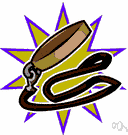leash
Also found in: Thesaurus, Idioms, Encyclopedia, Wikipedia.
leash
(lēsh)n.
1.
a. A chain, rope, or strap attached to the collar or harness of an animal, especially a dog, and used to lead it or hold it in check.
b. A strap or cord attached to a harness worn by a small child, used to prevent the child from wandering off.
c. A strap, cord, or other line used to keep an object close to its user or in a designated location.
2.
a. Control or restraint: emotions kept in leash.
b. A range of allowable behavior or responsibility: a husband kept on a short leash.
3.
a. A set of three animals, such as hounds.
b. A set of three.
tr.v. leashed, leash·ing, leash·es
To restrain with or as if with a leash.
[Middle English lees, lesh, from Old French laisse, from laissier, to let go; see lease.]
American Heritage® Dictionary of the English Language, Fifth Edition. Copyright © 2016 by Houghton Mifflin Harcourt Publishing Company. Published by Houghton Mifflin Harcourt Publishing Company. All rights reserved.
leash
(liːʃ)n
1. a line or rope used to walk or control a dog or other animal; lead
2. something resembling this in function: he kept a tight leash on his emotions.
3. (Hunting) hunting three of the same kind of animal, usually hounds, foxes, or hares
4. straining at the leash eagerly impatient to begin something
vb
(tr) to control or secure by or as if by a leash
[C13: from Old French laisse, from laissier to loose (hence, to let a dog run on a leash), ultimately from Latin laxus lax]
Collins English Dictionary – Complete and Unabridged, 12th Edition 2014 © HarperCollins Publishers 1991, 1994, 1998, 2000, 2003, 2006, 2007, 2009, 2011, 2014
leash
(liʃ)n.
1. a chain, strap, etc., for controlling or leading a dog or other animal; lead.
2. control; restraint: to keep one's temper in leash.
3. a brace and a half, as of foxes or hounds; set of three animals.
v.t. 4. to secure or control by or as if by a leash.
5. to bind together by or as if by a leash; connect; link; associate.
Idioms: strain at the leash, to struggle against constraints.
[1250–1300; Middle English lesh, variant of lece, lese < Old French laisse]
Random House Kernerman Webster's College Dictionary, © 2010 K Dictionaries Ltd. Copyright 2005, 1997, 1991 by Random House, Inc. All rights reserved.
Leash
Sporting, a brace and a half; a tierce, i.e., ‘three’. See also harl.Examples: leash of armies, 1705; of bucks, 1624; of days, 1609; of deer; of foxes, 1838; of greyhound, 1450; of hares, 1750; of hawks, 1486; of hounds, 1320; of kings, 1859; of languages, 1663; of partridges; of ratches, 1526; of snipe; of teal, 1826; of trout, 1882.
Dictionary of Collective Nouns and Group Terms. Copyright 2008 The Gale Group, Inc. All rights reserved.
leash
Past participle: leashed
Gerund: leashing
| Imperative |
|---|
| leash |
| leash |
Collins English Verb Tables © HarperCollins Publishers 2011
ThesaurusAntonymsRelated WordsSynonymsLegend:
Switch to new thesaurus
| Noun | 1. |  leash - restraint consisting of a rope (or light chain) used to restrain an animal leash - restraint consisting of a rope (or light chain) used to restrain an animalconstraint, restraint - a device that retards something's motion; "the car did not have proper restraints fitted" |
| 2. | ||
| 3. | leash - a figurative restraint; "asked for a collar on program trading in the stock market"; "kept a tight leash on his emotions"; "he's always gotten a long leash" restraint - the act of controlling by restraining someone or something; "the unlawful restraint of trade" | |
| Verb | 1. | leash - fasten with a rope; "rope the bag securely" |
Based on WordNet 3.0, Farlex clipart collection. © 2003-2012 Princeton University, Farlex Inc.
leash
noun
verb
straining at the leash impatient, eager, restless, chafing There are plenty of youngsters straining at the leash to take their place.
Collins Thesaurus of the English Language – Complete and Unabridged 2nd Edition. 2002 © HarperCollins Publishers 1995, 2002
leash
verbnoun
The American Heritage® Roget's Thesaurus. Copyright © 2013, 2014 by Houghton Mifflin Harcourt Publishing Company. Published by Houghton Mifflin Harcourt Publishing Company. All rights reserved.
Translations
رباط عُنْق الكَلْب
vodítko
hundesnor
talutushihna
póráz
ól, band
pasaitas
pavadasaitesiksna
vrvica
koppel
tasma kayışızinciri
Collins Spanish Dictionary - Complete and Unabridged 8th Edition 2005 © William Collins Sons & Co. Ltd. 1971, 1988 © HarperCollins Publishers 1992, 1993, 1996, 1997, 2000, 2003, 2005
Collins English/French Electronic Resource. © HarperCollins Publishers 2005
leash
Collins German Dictionary – Complete and Unabridged 7th Edition 2005. © William Collins Sons & Co. Ltd. 1980 © HarperCollins Publishers 1991, 1997, 1999, 2004, 2005, 2007
Collins Italian Dictionary 1st Edition © HarperCollins Publishers 1995
leash
(liːʃ) noun a strip of leather or piece of chain attached to a collar round its neck by which a dog etc is held.
Kernerman English Multilingual Dictionary © 2006-2013 K Dictionaries Ltd.